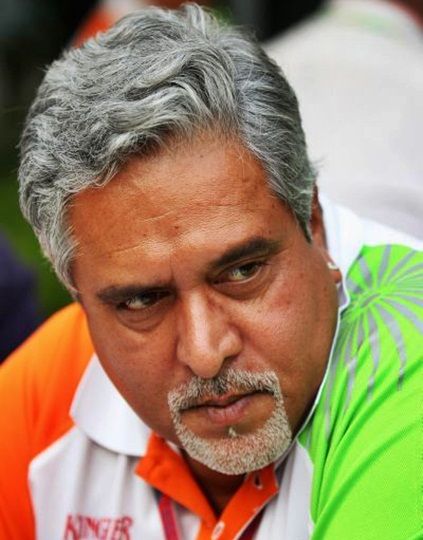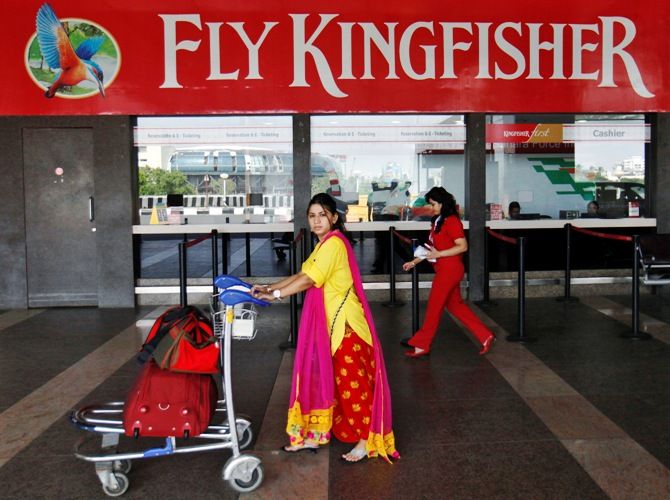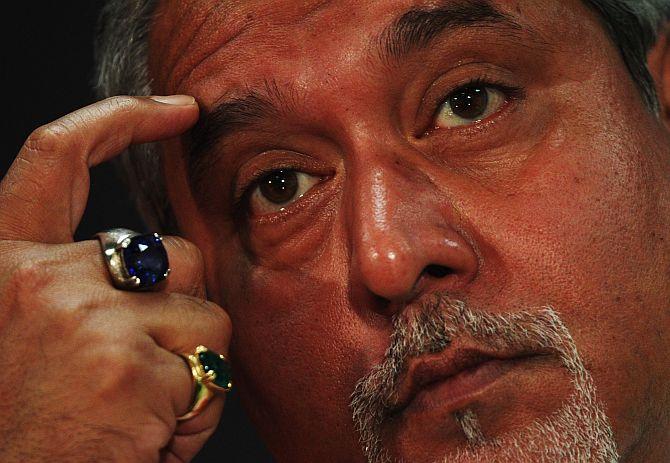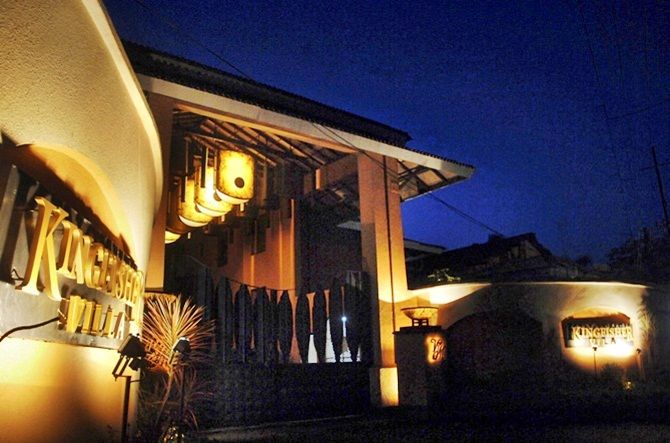Once the undisputed leader in the Indian alcoholic beverages market, Vijay Mallya has lost control of his companies, has been declared a wilful defaulter and faces several probes for alleged financial irregularities.

On December 18, Vijay Mallya will turn 60 or, as his friends joke, celebrate his third 20th birthday.
After being in business for well over 30 years, the former king of good times has hinted that this is the right time for him to start thinking of retirement and to "enjoy life".
Mallya has not yet called it quits. If he does, the businessman who was once called India's Richard Branson and has now been declared a wilful defaulter, will have enough time to ponder how he built the empire he inherited at the age of 28 after his father's death, and how he lost the distinction of being the most potent force in the Indian alcoholic beverages market.
Mallya, a member of the Rajya Sabha, is now a minority shareholder in three large companies he once ruled.

United Spirits, the century-old liquor maker, is now controlled by British major Diageo.
Dutch beverage maker Heineken already owns a majority stake in United Breweries, the maker of Kingfisher beer, and is out in the market to buy the shares Mallya had pledged to his banks.
And Mangalore Chemicals & Fertilisers, after a protracted battle with Deepak Fertilizers, now belongs to Saroj Poddar.
The wilful defaulter tag means it will be a long wait before banks agree to fund him one more time.

In other words, Mallya, who has always done things on a grand scale, will be out of action for a while.
That apart, Mallya also has to contend with ongoing investigations into allegations of financial impropriety.
The Central Bureau of Investigation, Serious Fraud Investigation Office, Securities and Exchanges Board of India, Enforcement Directorate and Income Tax Department are independently investigating several charges such as money laundering and tax evasion.
The Central Bureau of Investigation has carried out searches on Mallya's offices and residences in connection with the Rs 950 crore (Rs 9.5 billion) loan that IDBI gave to his Kingfisher Airlines, ignoring an internal report against disbursing the loan.

In July, the Supreme Court dismissed Mallya's appeal over a 15-year-old foreign exchange violation case by the Enforcement Directorate, stating that the appeal was "sheer abuse of the process of law".
"The enormous money power makes him believe that the state should adjust its affairs to suit his commercial convenience," the court noted.
The same month, United Spirits announced that the corporate affairs ministry and Income Tax Department have launched independent investigations, and sought the books of accounts of the company after an internal inquiry threw up illegal fund diversions to Kingfisher Airlines and other companies.
Many are uncertain what these investigations could yield.

"There is still not much out in the public domain. Investigations started quite late and they go dark and blank as they pursue," says Shriram Subramanian, managing director of InGovern, a proxy advisory firm.
"Somebody has to be motivated enough to unearth (his web of companies). There is still no agency that is motivated."
Mallya's undoing was his foray into aviation. Globally, airlines run on thin margins. So operations are tightly controlled.
Any oversight or deviation could cause costs to spiral and throw the company out of gear.
Kingfisher Airlines, which Mallya began on his son Siddarth's 18th birthday in 2005, was grounded within five years as losses mounted due to mismanagement and cost overruns.

Mallya, with some justification, often put the blame on the purchase of Deccan Aviation, India's first low-cost carrier, from Capt Gopinath.
Whatever be the reasons, Kingfisher Airlines ended up with bank debts of Rs 7,500 crore (Rs 75 billion).
To repay the creditors, Mallya started selling shares in his companies to Diageo and Heineken which were eyeing India's underserved alcoholic beverages market.
Diageo says it found - after it had completed the acquisition of United Spirits - that Mallya had diverted funds from the company to salvage Kingfisher Airlines.
Promptly, the United Spirits board, now under Diageo, recommended that Mallya be evicted as chairman for the lapse in corporate governance.

As on today, Mallya has 3.76 per cent shares in United Spirits, of which almost three-fifths are pledged with banks. The moment his shareholding drops to below 1 per cent, his exit from the company will be sealed.
At the recent annual general meeting of the United Spirits shareholders, where Mallya hinted at his retirement, Nicholas Bodo Blazquez, the head of Asia Pacific and Africa for Diageo, was elevated as the company's vice-chairman.
"He brings huge amount of value (to United Spirits); ultimately he is responsible for APAC and large geographies for Diageo. He is a great help and ultimately, you cannot be a batsman the rest of your life. Ultimately, you should think of retirement, isn't it?" said Mallya.

At United Breweries, Mallya and his family own a 32.46 per cent stake, nearly half of which is pledged with banks.
Shekhar Ramamurthy, the managing director of United Breweries, insists that even under Heineken, the management team put in place by Mallya has not changed.
"The organisational structure remains the same. Whatever little movement has happened has had no impact on the business," says he.
In November, State Bank of India, the country's largest bank, which led a consortium of 17 banks that gave Mallya loans, declared him a wilful defaulter.
Mallya, who had kept a low profile after his troubles with Kingfisher Airlines began, came out to say that he is in talks with banks to settle the Rs 8,700 crore (Rs 87 billion) dues.
Banks such as Yes Bank and HDFC, losing hope of a settlement, have begun invoking the pledged shares.

Photograph: Reuters
Mallya did not respond to a questionnaire on his plans after his initial promise to revert.
During his glory days, Mallya was the toast of high society.
When he launched Royal Challengers, picking Virat Kohli just after his under-19 world cup victory, the glitterati waited at a Bengaluru hotel for over four hours for the party to kick off.
Now, Mallya has few friends. His childhood friend and Biocon Chairperson Kiran Mazumdar Shaw is the only public personality who has stood by him.
"No way - it's too tough to retire so early," she tweeted on his comments on retirement.
Son Siddarth, who Mallya looked at as a successor, is back in the UK studying in the Royal Central School of Speech and Drama.
His debut movie Brahman Naman will be released at the Sundance festival in the US next year.
Mallya stays largely outside India, shuttling between the UK and the US.

Still, many of Mallya's friends and associates believe that he will bounce back.
"He still has the hunger to fight. He will recover. Yes, everyone makes a mistake, but for him, the cost has been huge," says a UB official who has worked with Mallya for over two decades and does not want to be named.
Mallya is an avid risk taker. Quite a few bets he has lost. This includes his Janata Party's rout in the Karnataka assembly elections in 2004.
The next year, he found political support to enter the Rajya Sabha.
His second term in the Upper House will end in July 2016, after which his political clout will come down considerably.
Yet, even as the chips are down, Mallya could stage a comeback.
"I don't think Mallya being a law maker or not will affect his cases. He has always managed to overcome them," says Subramanian.










